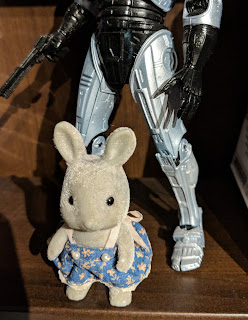Bookshelf Update April/May 2025
Previous Bookshelf Update post
The continued adventures of reading and rereading books I'm not sure I want to keep on my bookshelves.
The Robots of Dawn
Isaac Asimov, 1983
Whoops. This has sat on my shelf for a very long time, and I think that when I bought it (on a dollar rack, surely), I thought it was one of the collections of Robot stories (I read some of those many years back and remembered enjoying them). Instead, this is an odd novel.
This is the third in a series I haven't read any other book in, written decades after the others, and serves as one of a few pieces written around this time that were clearly meant to directly connect the Robot series with the Foundation novels. The characters are fine, if nothing all that special now. The mystery plot is okay, but a bit slow. The book ends with an extremely awkward reveal/twist that's a big part of the aforementioned tie-in with Foundation and I really could have done without it.
Overall an ok book, but not one I'm sorry to let go.
Stardance
Spider and Jeanne Robinson, 1977 (novella version) 1983 (novel)
Hey, another book I bought by accident!
My copy says "Hugo-Award-Winning Novel" on the front, but that's a lie. The first third of it is a Hugo-Award-Winning novella, and that's all of it I could bring myself to read. It's a dated piece (in many of the same ways that other sci-fi from the late '70s is dated) about dance in zero-gravity and a tiny bit about using dance to communicate humanity to aliens. Fine concept, meh read.
Back to the discount racks from whence ye came!
Rite of Passage
Alexi Panshin, 1968
I didn't buy this one off the discount rack by accident. I bought this one off the discount rack because I went to college with one of the author's sons, and I was curious.
Finally read it, and it was pretty decent!
It's a story about a girl who lives in a spaceship in a society with a very specific coming-of-age process. The ship has a complicated and contentious relationship with colony planets, and humanity is split between those who live on the planets and those who live on the ships. I liked that Mia was a fairly unreliable narrator. Her prejudices are obvious to the reader, I think, but I also enjoyed that she is prickly, stubborn, and overall full of her own importance in a very preteen way.
The story pokes at multiple moral questions in a satisfying way. Whether this split future for humanity is sustainable is an open question at the end, and whether it will end up more like a utopia or a dystopia is left to the reader to wonder.
So, a pretty interesting book, but will I keep it? Ehhh... I probably wouldn't keep it for it's own sake (right now shelf space is really for the ones I absolutely love), but I might for the sake of the personal connection.





Comments
Post a Comment
FYI: Most comments are moderated, and will not appear immediately.